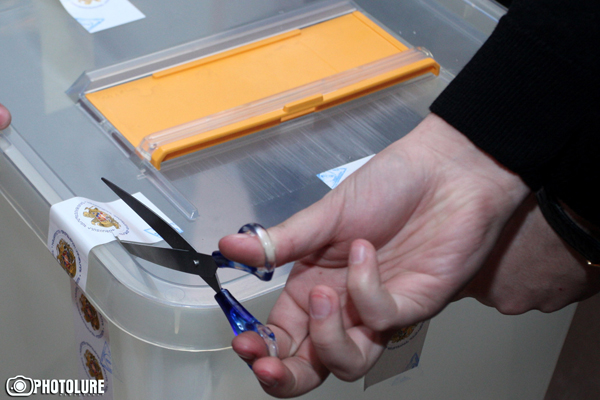Electoral Code out of Sight

In all likelihood, draft bill to Electoral Code, after adoption at the Parliamentary session, will be sent to the National Assembly. NA Chairman will send it to the Standing Committee on State and Legal Affairs, and 20 days following the entry it’ll be discussed at the Committee’s session, then introduced in the agenda of NA plenary session. Note, this crucial amendment of 2016 will come into force until June. This is the claim of Venice Commission.
Political majority has sent new version of Electoral Code to Venice Commission. David Harutyunyan, who enjoys the fame of “a leading lawyer” among the authorities, Minister-Chief of RA Government staff, told one of the mass media, they haven’t received the answer yet.
RPA (Republican Party of Armenia) members avoid revealing new provisions and mechanisms enshrined in the new Code. Other political powers have just some patchy information on it.
Hovhannes Sahakyan, Chairman of the Standing Committee of State and Legal Affairs of the National Assembly, in an interview with 168.am stated, that until March 10 the draft bill will be available to them, and prior to that he refused to give any comments.
“ I’m not going to say anything essential before we have the draft bill. Political figures may speak on amateur level, and Chairman of the Committee isn’t entitled to say this, and after obtaining the bill, express other view,” Sahakyan said.
In response to Aram Manukyan’s, ANC (Armenian National Congress) Faction Secretary, statement, that Georgia’s best precedent is applicable in Armenia as well, and by our neighbor’s example we should clean up voter lists, H.Sahakyan said, “We are Armenians, neighbor’s bride is always nicer (Armenian proverb). We don’t know what we’re going to do and not to do, that’s why let the draft bill come, and then we’ll speak.”
We tried to have some clarifications from Vahram Baghdasaryan, head of NA RPA Faction. However, he gave elusive replies, saying any point in Electoral Code isn’t final, everything should be passed by the NA, as a result of discussion, “It’s just a draft bill, and there are disputable and discussable points, which should come to a conclusion as a result of political discussions.”
V.Baghdasaryan doesn’t share concerns of the opposition power, that preference voting may divert the meaning of proportional electoral system, and it will more act by majoritarian system, “I don’t think so. Models and options will be proposed, which will be more consistent with the proportional system. Fir this, it’ needs to be discussed.”
In response to the question, to which extent political majority is ready to agree with proposals by opposition, head of RPA Faction assured, that they are ready to discuss all the offers. To our remark, that discussing doesn’t at all mean adopting, V.Baghdasaryan replied, “If reasonable proposals will be made as a result of discussions, we’ll adopt them, This isn’t for the first time, the same happened during Constitutional amendments.” V.Baghdasaryan expressed readiness to discuss Aram Manukyan’s offer on Georgia’s precedent and cleaning up of the voter lists, if the ANC MP submits it. He assured, that RPA shares the opinion, that voter lists need to be cleaned up.
Independent MP Edmon Marukyan considers, that it’d be better if opposition platform, on building of which the parties are currently negotiating, submitted common proposals. In his words, there isn’t considerable difference, that the draft bill was sent to Venice Commission without discussing it with other political powers, more concerning is separation of spaces and preference voting, “We’re against it, as on regional or territorial level preference voting is a veiled majoritarian electoral system, which is worse than the existent majoritarian system. In that case, for instance, any non-partisan may not be nominated and elected, like I was.”
In E.Marukyaan’s words, the issue that the authorities are ready to that system, and the opposition—no, accordingly a system is being invested, by which only they might have success, is rather problematic, “Just from the very start they provide their victory, frauds in polling stations may be excluded, however serving that regional preference voting to their purpose, they’ll record success, which they couldn’t, for instance, by technical proportional electoral system.”
Tevan Poghosyan, “Heritage” Faction Secretary, proposes to take the initiative and appear with their own draft bill approved by Venice Commission at the authorities-opposition “duel” on Electoral Code. According to him, all opposition factions should have discussions, develop common formulations of the Code and submit it to Venice Commission for approval. T.Poghosyan stated, that any faction is entitled to send a letter to Venice Commission, for instance, ARF and “Heritage” took this step at previous parliamentary convocation, 2 years ago Rule of Law party, “Heritage”, ANC and PAP have submitted a proposal on publication of voter lists and etc. The fact, that RPA has initiated an internal draft bill and submitted it to Venice Commission without consulting with others, as per assessment of T.Poghosyan, solely speaks of one thing—RPA isn’t willing to cooperate and work out a common draft bill.
T.Poghosyan expressed uncertainty on partial electronic voting enshrined in the new Code, pursuant which in the registration phase an electronic method is applied, when the voter checks in the polling station whether he/she has the right to vote or not, “What does partial electronic option mean? If they’re going only to check, this means, we’re not likely to have electronic voting, but a mechanism of electronic checking. If formerly people were checking it by their passports, currently they’re going to do it with a computer, This isn’t electronic voting. Electronic voting is when you vote electronically.”
Naira Zohrabyan, Head of PAP Faction, doesn’t consider it a “big tragedy” that the Electoral Code has been submitted to Venice Commission before discussion with other powers. She stated, that PAP has prepared a package of proposals, “If it’s acceptable, we’ll come to a compromise and try to have a good document, if not—we’ll see. We’ll live and see.”
As compared to other opposition powers, N.Zohrabyan isn’t bothered with preference voting, “Preference voting has various modifications, and which one is included in the document, will be available to be discussed only after acknowledgement with the document.”
By Gayane Khachatryan

























